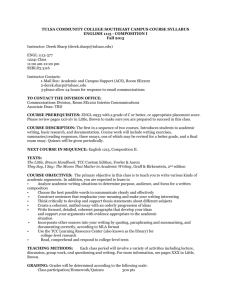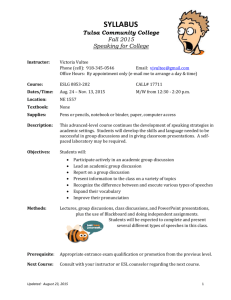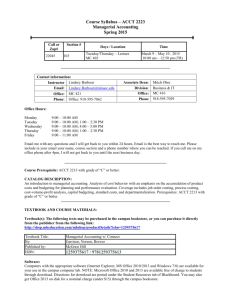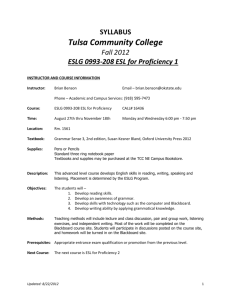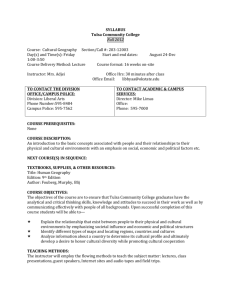ENGL_0933_191_13708_201010 - Blackboard
advertisement
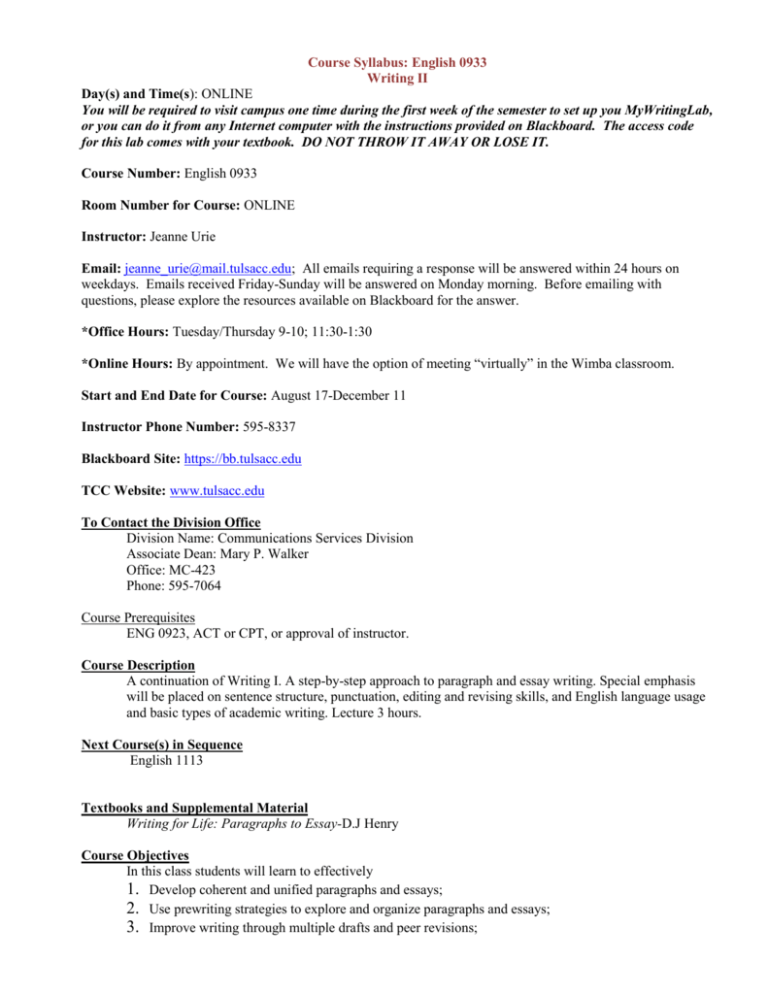
Course Syllabus: English 0933 Writing II Day(s) and Time(s): ONLINE You will be required to visit campus one time during the first week of the semester to set up you MyWritingLab, or you can do it from any Internet computer with the instructions provided on Blackboard. The access code for this lab comes with your textbook. DO NOT THROW IT AWAY OR LOSE IT. Course Number: English 0933 Room Number for Course: ONLINE Instructor: Jeanne Urie Email: jeanne_urie@mail.tulsacc.edu; All emails requiring a response will be answered within 24 hours on weekdays. Emails received Friday-Sunday will be answered on Monday morning. Before emailing with questions, please explore the resources available on Blackboard for the answer. *Office Hours: Tuesday/Thursday 9-10; 11:30-1:30 *Online Hours: By appointment. We will have the option of meeting “virtually” in the Wimba classroom. Start and End Date for Course: August 17-December 11 Instructor Phone Number: 595-8337 Blackboard Site: https://bb.tulsacc.edu TCC Website: www.tulsacc.edu To Contact the Division Office Division Name: Communications Services Division Associate Dean: Mary P. Walker Office: MC-423 Phone: 595-7064 Course Prerequisites ENG 0923, ACT or CPT, or approval of instructor. Course Description A continuation of Writing I. A step-by-step approach to paragraph and essay writing. Special emphasis will be placed on sentence structure, punctuation, editing and revising skills, and English language usage and basic types of academic writing. Lecture 3 hours. Next Course(s) in Sequence English 1113 Textbooks and Supplemental Material Writing for Life: Paragraphs to Essay-D.J Henry Course Objectives In this class students will learn to effectively 1. Develop coherent and unified paragraphs and essays; 2. Use prewriting strategies to explore and organize paragraphs and essays; 3. Improve writing through multiple drafts and peer revisions; 4. Recognize and write different modes of expository writing, such as narrative, comparison/contrast, process, cause and effect, and exemplification; 5. Use dictionary and thesaurus effectively in choosing descriptive and accurate words; and 6. Write with clarity and mechanical correctness, using Standard English language. Suggested Resources A dictionary and a thesaurus are helpful, if not essential, for successful writing. You will need some type of removable computer device to which you will save your work. The USB flash drives are a reliable and handy tool, with greater capacity than a floppy disk. I caution you not to save your work to the hard drives on TCC computers in the TLC or library. All material on the hard drives is erased at the end of each day; therefore, you cannot retrieve documents from one day to the next. I strongly urge you to compose all work in Microsoft Word and then copy and paste it to the correct section in Blackboard. Blackboard has been known to crash, and you will lose all of your work if you have not saved it elsewhere. Always keep a copy of anything you post on Blackboard as well. Teaching Methods This class will include lectures, PowerPoint’s, discussion boards, Wimba sessions, and group activities. Basic computer skills including Microsoft Word, email, and Blackboard proficiency are a must. You will be required to post to the discussion board, compose using Microsoft Word, take online quizzes, participate in virtual classroom sessions, use a WIKI, and communicate with the instructor via email. If you are uncomfortable with any of these tasks, I suggest you enroll in a computer concepts course prior to taking this course. Time will not permit me to assist you with computer related issues. Syllabus Changes The instructor may change the syllabus through announced or published changes. Attendance Policy Weekly student participation and response in online courses is considered a necessary factor in the learning process. In this form of computer-based learning, weekly course participation is the equivalent to class attendance. Online participation may include: e-mail to faculty/class members, response to a bulletin board posting, an assignment being turned in, and other communication reflecting ongoing learning in the course. If no student response occurs during a week in the semester, the student is considered absent. Students who are excessively absent are subject to administrative withdrawal. Bad Weather or Emergency Cancellation Policy Tulsa Community College rarely closes. Classes may be cancelled if extreme weather conditions or emergency situations arise. TCC always gives cancellation notices to radio and television stations. This information is also available on the TCC website. If this happens, please refer to Blackboard site (https://bb.tulsacc.edu) for the course website. Any changes related to the class will be posted on this site. Late Work/Make-up Exam Policy Weekly assignments are due by midnight on Friday. Assignments will not be accepted after midnight each Friday, and no points will be given for assignments that are submitted after midnight each Friday. The right to make-up a test is at the discretion of the instructor. As student wishing to take an exam at any time other than the scheduled time must contact the instructor prior to the exam. If the instructor grants a make-up time, the student will be penalized 10%. No extra credit will be given. Timely Communication All E-mails will be answered within 24 hours M-TH and on Monday when received on the weekend. All assignments will be graded within seven days of the due date. Withdrawal/Audit Policy The deadline to withdraw from a course shall not exceed 3/4 the duration of any class. The last day to “withdraw” or to change from “credit to audit” this semester is Friday, November 13, 2009. Not attending class does not constitute withdrawal. Before you withdraw from a course, be sure to complete the following steps: 1. Talk with me. There may be alternatives to withdrawal that you have not considered. Withdrawing from a course is a decision that you and I should make together. 2. If we decide that withdrawal from the course is best, you should go to the Counseling Office in MC 1014 and request the “Withdrawal” form. 3. Staff in the Counseling Office will help you fill out the paperwork and process the withdrawal. 4. You should keep a copy of the withdrawal form as a permanent record of the transaction. Note: Students who stop participating in the course and fail to withdraw may receive a course grade of “F,” which may have financial aid consequences for the student. Classroom Etiquette Open and mutually respectful communication of varied opinions, beliefs, and perspectives during classroom or online discussion encourages the free exchange of ideas that is essential to higher learning and to the ability to learn from each other. Required Format for Assignments All assignments should be typed in MLA format using Times New Roman 12 pt. font. The document should be double spaced. Student Email Communications All TCC students receive a designated “MyTCC” email address (ex: jane.doe@mail.tulsacc.edu). All communications to you about TCC and course assignments will be sent to your MyTCC email address; and you must use MyTCC email to send email to, and receive email from, the instructor regarding this course. All emails will be answered within 24 hours during the week and 48 hours on the weekend. Grading Scale Wiki and Misc. Assignments* 100 points Wiki assignments are generally assignments out of the textbook. You will have a Wiki set up where you will complete each assignment. Journal 100 Points The journal will also be located on your Wiki, but it is where you will answer writing prompts, reflect, and brainstorm, plan, draft and revise your paragraphs and essays. Final Drafts Paragraphs & Essays 200 points (2 paragraphs @ 25, 1 paragraph @50, 1 Essay @ 100) You are required to write three paragraphs and one essay during the semester. This does not include the paragraphs and essays written in your journal or on the midterm and final Quizzes 150 points You will take 12 quizzes worth a total of 150 points Midterm 50 points The midterm will cover writing and grammar My Writing Lab 250 points My Writing Lab is the equivalent of visiting an on-campus lab but can be done online. You receive a free access code for the lab when you purchase the textbook. DO NOT LOSE THE CODE. You must complete 1.5 hours of lab each week. Instructions for setting up and accessing the lab will be available during week one. You can visit the writing center at Metro Campus for assistance as well. Research Project 50 Points Final 50 Points Timed Writing GRADING SCALE: 900-1000 = A (Exceptional; full mastery of assignment) 800-899 = B (Good; strong fulfillment of assignment) 700 - 799 = C (Average; satisfactory fulfillment of assignment) 600 - 699 = D (Poor; less than satisfactory or incomplete) 0 - 599 = F (Failing; incorrect, missing or plagiarized) METRO Instruction Labs Writing Center—MC-2000 (South end) Academic Mathematics Lab—MC-302 Microcomputer Lab—MP-200 Communications/Reading Lab—MC-536 Foreign Language Lab—MC-430A The A Assignment: Meets all the course objectives (Note: it may contain a few minor deficiencies) Shows originality of thought Fulfills the requirements of the assignments Contains no serious errors in grammar or mechanics The B Assignment: Meets all the course objectives (Note: it may contain a few minor deficiencies) Fulfills the requirements of the assignments Contains no serious errors in grammar or mechanics The C Assignment: Attempts to meet all the course objectives, but falls short in certain areas Fulfills the requirements of the assignments May contain very few serious errors in grammar or mechanics The D Assignment: Attempts to meet all the course objectives, but falls short in many areas Fulfills the requirements of the assignments May contain serious errors in grammar or mechanics The F Assignment: Attempts to meet all the course objectives, but falls short in most areas May contain serious errors in grammar or mechanics Serious Errors in Grammar and Mechanics: Unjustified Sentence Fragments Comma Splice Fused Sentences (Run-on Sentences) Failure in subject and verb agreement Semicolon Separating an Independent and a Dependent Clause Confused Pronoun Reference Wrong Pronoun Reference Misplaced Modifiers Dangling Modifiers Excessive Errors in Spelling and Punctuation Academic Dishonesty Academic dishonesty (cheating) is defined as the deception of others about one’s own work or about the work of another. Academic dishonesty or misconduct is not condoned or tolerated at campuses within the Tulsa Community College system. Tulsa Community College adopts a policy delegating certain forms of authority for disciplinary action to the faculty. Such disciplinary actions delegated to the faculty include, but are not limited to, the dismissal of disrespectful or disorderly students from classes. In the case of academic dishonesty a faculty member may: Require the student to redo an assignment or test, or require the student to complete a substitute assignment or test; Record a "zero" for the assignment or test in question; Recommend to the student that the student withdraw from the class, or administratively withdraw the student from the class; Record a grade of "F" for the student at the end of the semester. Faculty may request that disciplinary action be taken against a student at the administrative level by submitting such a request to the Dean of Students. Computer Services Acceptable Use Access to computing resources is a privilege granted to all TCC faculty, staff, and students. Use of TCC computing resources is limited to purposes related to the College’s mission of education, research, and community service. Student use of technology is governed by the Computer Services Acceptable Use Statements/ Standards found in the TCC Student Code of Conduct Policy Handbook. These handbooks may be obtained by contacting any Student Activities or Dean of Student Services office. ADA Policy Students with special needs: Students with documented disabilities are provided academic accommodations through the disABLED Student Resource Center (595-7115) or the Resource Center for the Deaf and Hard of Hearing (595-7428/TDD-TTY 595-7434). If any student is in need of academic accommodations from either office, it is the student’s responsibility to advise the instructor so an appropriate referral can be made no later than the first week of class. Students may also contact the disABLED Student Services offices directly at the applicable telephone numbers indicated. Academic accommodations will not be provided unless appropriate documentation is provided to the disabled student services offices to support the need. Institutional Statement Each student is responsible for being aware of the information contained within the TCC Catalog, TCC Student Handbook, TCC Student Code of Conduct Policy Handbook, and semester information listed in Class Schedule: -TCC Catalog: http://www.tulsacc.edu/page.asp?durki=25 -Class Schedules: http://www.tulsacc.edu/page.asp?durki=26 -Student Policies and Resource Handbook: http://www.tulsacc.edu/page.asp?durki=2984 -TCC Terminology: http://www.tulsacc.edu/page.asp?durki=972 -Frequently Called TCC Numbers: http://www.tulsacc.edu/page.asp?durki=86 -METRO Student Organizations: http://www.tulsacc.edu/page.asp?durki=278 -Student Activities—College Wide: http://www.tulsacc.edu/page.asp?durki=971 -TCC Orientation: http://www.tulsacc.edu/page.asp?durki=2731 Mission Statement The mission of Tulsa Community College as defined by the Oklahoma State Regents for Higher Education is to: Tulsa Community College betters its community through the intellectual achievement, creative energy, and responsible citizenship of its students, faculty, and staff by their engagement in teaching, learning, and service opportunities that transform and enrich lives. Tulsa Community College commits to innovative, flexible, and affordable public higher education that responds to a dynamic global environment. TCC Core Values Student Success is the reason TCC exists. We strive for all students to be successful in their educations and we strive for the education to effectively prepare students for their lives. Learning is the focus because it is the essence of an institution of learning. Excellence drives us. We strive to provide excellent education to our students, excellent resources to our community, and excellent administration and management for our employees. Stewardship guides our daily decision-making. We investigate community needs and expectation and then respond by providing quality education that is responsive, convenient and affordable. Innovation sparks our creativity and ensures that the hearts and minds of our students, faculty, staff and administration are actively engaged in acquiring learning, increasing our knowledge, and leading the community forward. Diversity is our common bond. Sincere appreciation for and cultivation of differences enriches our lives, the community and the education we offer. It is a source of our pride and integral to our success. TCC General Education Goals Tulsa Community College students will be able to demonstrate: Goal #1: Critical Thinking Critical thinking is the ability to use reasoning skills or strategies to analyze, evaluate and integrate information. Goal #2: Effective Communication Effective communication is the ability to develop organized, coherent, unified written and oral presentations for various audiences and situations. Goal #3: Engaged Learning Engaged Learning is meaningful participation in civic, scholarly and cultural activities. Goal #4 Technological Proficiency Technological proficiency includes knowledge of productivity and communication application tools, electronic research capability, and discipline-related technologies. Tentative Schedule**(This schedule may change. All changes will be announced) UNIT ONE: INTRODUCTION TO CLASS Week One: August 17-21 1.1: Wiki Introduction 1.2: Distance Learning Orientation (quiz 1) 1.3: Set up My Writing Lab and take Pretests 1-4 1.4: Journal 1-Writing Diagnostic UNIT TWO: INTRODUCTION TO WRITING Week Two: August 24-28 2.1: Read Chapters 1-2 (p. 2-48) 2.2: Wiki Exercises 2.3: Lab Work- (Getting Ready to Write) 2.4: Journal 2.5: Quiz 2 Week Three: August 31-Sept. 4 3.1: Read Chapter 3 (p. 50-67); Ch. 21-23 (Fragment, Dangling Modifiers, Comma Splices, Run-On Sent.) 3.2: Wiki Exercises 3.3: Lab Work (Recognizing and Avoiding Errors-Fragments, Dangling Modifiers, Run-on Sentences) 3.4: Journal 3.5: Quiz 3 UNIT THREE: PARAGRAPHS Week Four: September 7-11 4.1: Read Chapter 4 (p. 68-87); Ch. 24-26 (Subj./Verb Agreement, Past Tense) 4.2: Wiki Exercises 4.3: Lab Work (Recognizing and Avoiding Errors-Subj/Verb Agreement, The past tense of verbs, and Using Patterns of Organization to Develop Paragraphs) 4.4: Paragraph One Assignment 4.5: Journal 4.6: Quiz 4 Week Five: September 14-18 5.1: Read Ch. 27-28 (516-556-Nouns, Pronouns, Adjectives, Adverbs) 5.2: Wiki Exercises 5.3: Lab Work (Recognizing and Avoiding Errors: Nouns, Pronouns, Adjectives, Adverbs and Using Patterns of Organization to Develop Paragraphs) 5.4: Descriptive Paragraph One due 5.5: Journal 5.6: Quiz 5 Week Six: September 21-25 6.1: Read Ch. 5 (88-105); Ch. 29 (Commas-559-576) 6.2: Wiki Exercises 6.3: Lab Work (Punctuation and Mechanics: Commas) 6.4: Narrative Paragraph Two 6.5: Journal 6.6: Quiz 6 Week Seven: September 28-October 2 7.1: Read Ch. 9 (166-183) 7.2: Wiki Exercises 7.3: Lab Work (Punctuation and Mechanics: Commas) 7.4: Comparison/Contrast Paragraph Three 7.5: Quiz 7 Week Eight: October 5-9 8.1: Read Ch. 12 (222-240) 8.2: Wiki Exercises 8.3: Lab Work (Your choice) 8.4: Journal 8.5 Midterm Exam UNIT FOUR: ESSAYS Week Nine: October 12-16 9.1: Read Chapter 13-Understanding the Essay (242-271) 9.2: Wiki Exercises 9.3: Lab Work (Writing the Essay-Understanding the Essay One) 9.4: Journal 9.5: Quiz 8 Week Ten: October 19-23 10.1: Read Chapter 14-Effective Introductions, Conclusions, and Titles (278-281) 10.2: Wiki Exercises 10.3: Lab Work (Writing the Essay-Introductions, Conclusions, and Titles) 10.4: Essay One Assignment 10.5: Journal 10.6: Quiz 9 Week Eleven: October 26-30 11.1: Read Chapter 15 (Using Patterns of Organization to Develop Essays/Narrative Essays 288298) 11.2: Wiki Exercises 11.3: Lab Work (Understanding the Essay II) 11.4: Journal 11.5: Quiz 10 Week Twelve: November 2-6 12.1: Read Chapter 34 (632-644) 12.2: Wiki Exercises 12.3: Lab Work (Your Choice-Essay Help or Editing) 12.4: Essay One Due 12.5: Journal 12.6: Quiz 11 Week Thirteen: November 9-13 13.1: Chapter 32-33 (606-629) 13.2: Wiki Exercises 13.3: Lab Work (End Punctuation and Capitalization) 13.4: Research Assignment 13.5: Journal 13.6: Quiz 12 Week Fourteen: November 16-20 14.1: Wiki Exercises 14.2: Lab Work (Your Choice) 14.3: Research Assignment Due 15.4: Journal Thanksgiving Week: November 23-27 (no assignments) Week Fifteen: November 30-December 4 15.1: Wiki Exercises-Review for Final 15.2: Lab Work (Diagnostic Posttest) Finals Week: December 7-11 16.1: Final Exam-Timed Writing Essay

